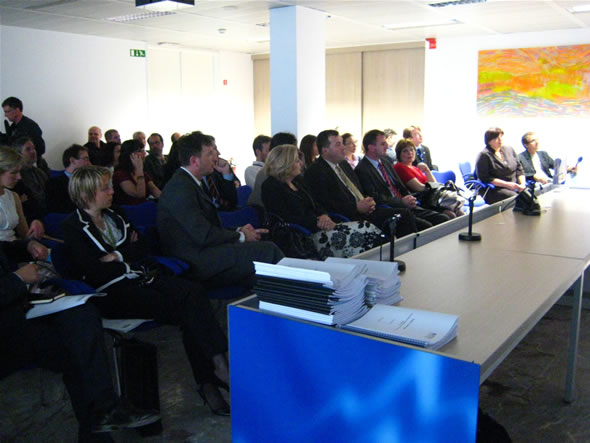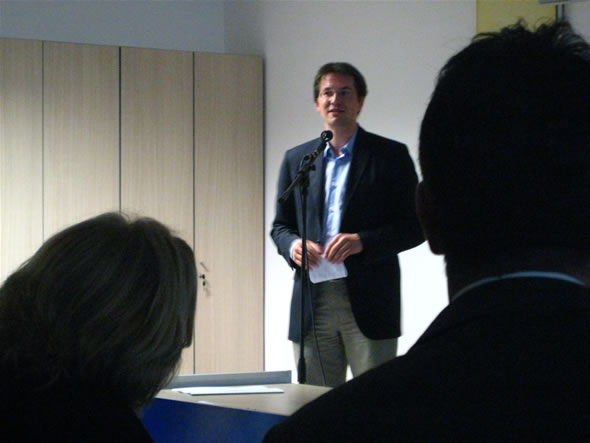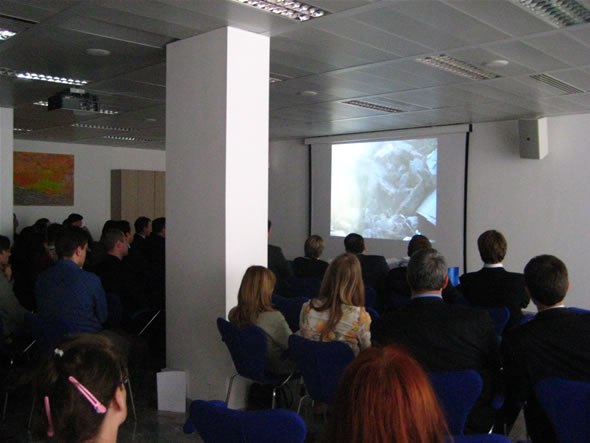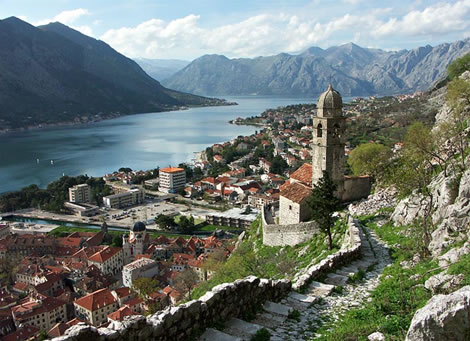
Kotor – View from St. Ivan’s Fortress, Montenegro
|
|
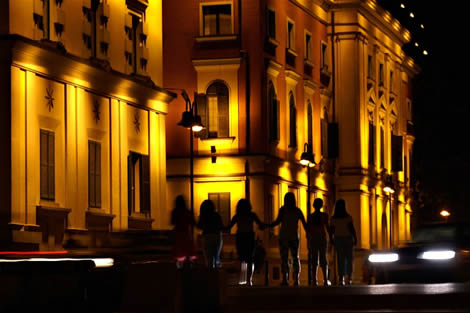
Tirana – Bulevardi Deshmoret e Kombit, Albania
|
|
Are Montenegro and Albania leading a new Adriatic push for EU enlargement in the Balkans in the coming months?
|
Montenegro is actively considering when to apply for EU membership and is likely to do so as early as May or June this year. The leader of the Albanian opposition, Edi Rama, has urged the Albanian government in a speech in Brussels this week to prepare such an application for September, offering the support of the opposition. Bosnia might well submit an application this year as well, a senior Bosnian official told ESI in Paris a few days ago. And Serbia, ESI has been told by the head of the Serbian Directorate for European integration, has been preparing to submit its application for EU membership for many years, only waiting for the signature of its Stabilisation and Association Agreement to proceed.
In recent days ESI asked leading Europeanizers, officials promoting the EU agenda in Montenegro, Albania, Croatia, Bosnia-Herzegovina and Serbia, about their plans for 2008. Their responses suggest that it is likely that this year all Western Balkan states who have not done so already will formally apply to become candidates to join the EU, under the Slovenian or under the French EU presidencies.
Some EU member states might find this a surprising development. However, this also offers the EU an opportunity to reaffirm European influence and secure stability at a moment when developments in Kosovo, Serbia and Macedonia are posing a potentially very serious threat to a successful EU common foreign policy in the Balkans.
[MEDIA=7]
Gordana Djurovic on Montenegro’s path into the EU. © ESI
The Deputy Prime Minister of Montenegro, Gordana Djurovic told her colleagues from the other Balkan countries at an ESI event in Paris on 17 April that “the month of May is a nice time” for submitting an application for membership:
“Our European road is quite clear. Political and economic stability and good economic trends support the process. There is a strong political and national consensus regarding integration. So why not try to follow the reform process with the opening of new phase of integration?”
She notes that Montenegro will not be discouraged by signals from EU member states possibly urging it to slow down its progress:
“Becoming an EU member is not one act – it is a process. We talk about a very early phase. To submit the application is just to keep the EU door open for us. We will work hard after the decision.”
“We are now in an intensive process of communication. We have tried to share with our colleagues from EU member states our proposal, to explain our arguments and why we think it is the right time to submit an application. … Of course we have received some messages from the Slovenian side during their presidency. I am responsible for coordinating the European integration process in our Government. After all this communication, which will be finished at the end of April, I will write a paper and advise our political actors to decide about submitting the application as soon as possible.”
“In a constructive dialogue with EU member states during the past two months we tried to explain that time is also very valuable. Not only because of economic reasons but also because of political reasons. We tried to explain that, from our perspective, two years is quite a long period. We can finish a lot of European tasks in the meantime if we are allowed to continue …”
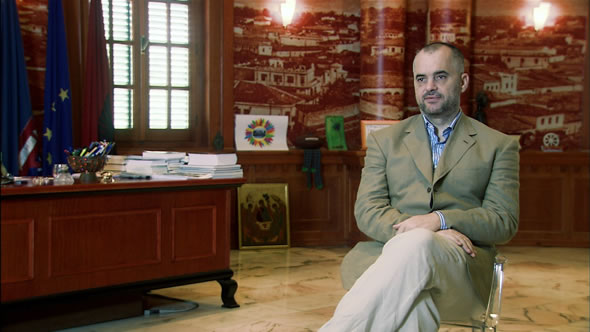
Edi Rama (Mayor of Tirana)
At another event in Brussels a few days later the leader of the Albanian opposition, Edi Rama, launched an appeal to the Albanian government to follow in the footsteps of Montenegro:
“Thanks to the fact that we have created a climate of cooperation, with the focus on NATO integration, we succeeded to come out with a very important result: the invitation to join NATO. On the other hand we realised the importance of conditionalities in this process, making the Albanian political class, the Albanian parliament, the Albanian government, aware of their own roles. I think from this experience of getting together, fulfilling our duties concerning justice reform and electoral reform, going together towards an objective, showing the will to find common ground as in all mature democratic countries, we have realized – and this is both my personal, but also a common conviction among the opposition – that we can do much more also in the EU integration process”
“So, I would like very much to make clear that we have enough reason to build upon this positive momentum reached by the invitation for NATO, and to go ahead with a new challenge of Europeanisation. This should really become the key word everywhere, in the country, but I very much believe also in the region. … This is not about favours, it is about real conditionality, which I think is very helpful to give a new push to the process of EU integration. In that respect, as the leader of the opposition, I believe that it is vital for the Albanian government to submit an application for EU membership by this autumn, September at the least. This is of course a sovereign decision, as it is a sovereign decision by the EU how to react. I strongly believe that this will really give us the opportunity to make this important re-assessment.”
“At the end of the day democracy is about how you disagree with each other. And the way of disagreeing gives quality or not to democratic life. We will continue to strongly disagree on domestic issues, but we will continue to push, as opposition, the government to take the risk, to be courageous and to go ahead with this application submission.”

Osman Topcagic
Osman Topcagic, the head of the Directorate of European integration, told ESI in Paris that Bosnia also needed to define for itself an ambitious objective:
“More Europe in the region means more stability, more economic prosperity more jobs – more employment that’s what we also need, so that is good. …
“What we have as our goal and officially defined in Parliament is to get candidate status by 2010. That would mean applying this year, so we still have not decided when exactly. Will it be during the Slovenian presidency, or in the second half of this year during the French presidency? I think we need to apply this year. We need to show good results, initial results in implementing SAA. To show that we have structures, we have good understanding of the Agreement, and there must be political will. That really is present in Bosnia-Herzegovina, all parties support the European integration process, and the public is very much in favour, 80 percent or more. So I am confident that we will submit an application before the end of the year, and then work hard to get Candidate status by 2010. That is another phase in this process, that is more encouragement for reform processes in Bosnia Herzegovina, and we know that we need to do much more in the next stages of this process but I am confident that we can do it. Other countries in our region did it, or are doing it, and we can do it.”
In the eyes of Osman Topcagic, one of the major advantages of European integration is that the process energizes the administration of a country. It brings new and qualified people to join the public sector:
“This is a really exciting process and many young people are attracted, I can tell you! We were recently in process of hiring 15 juniors and we had 600 applications, and it was really difficult to select the best of them. They wanted to work with us because we had such an image. People are attracted by our work, by the process itself, they want to be part of it, knowing in that way they can gain necessary experiences, but also they can advance in their career and career development”
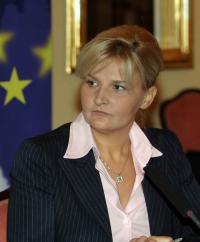
Tanja Miscevic
Tanja Miscevic from Serbia outlined her hopes in Paris that the deadlock in Serbia related to the EU will finally be overcome in 2008:
“Immediately when we received the famous Feasibility Study at the beginning of April back in 2005 we started thinking not only about negotiating the Stabilisation and Association Agreement but about what would be the next steps? Immediately we reached the conclusion that the logical next step for us would be to apply for membership immediately after the signing of the Stabilisation and Association Agreement. And when we thought about the idea, we also had to think about those things that are necessary to be prepared in order to apply immediately for membership and candidate status.
She notes how important the progress of Serbia’s neighbours is for Serbia itself:
“I am really happy because of that, because that is for us a clear sign that there is a possibility, there is a road, and according to our merits, according to fulfilling the criteria we should, we also can apply. That is not a question anymore. … But somehow we are trapped in the non-existent political consensus in Serbia, not only about European integration but also about reforms, which is in fact the same as the process of European integration.”
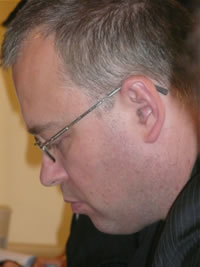
Neven Pelicaric
All Western Balkan Europeanisers also draw inspiration from the experience of Croatia, as explained by Neven Pelicaric, Croatia’s Assistant Minister for Europe:
“It is a sovereign decision when the country and its political leaders and its people believe they are ready. It is up to them to set the timing. … We have been able to answer to 4,894 questions we have received. It took us or we were given 3.5 months to do so. There were of course some subsequent questions asked for clarification. And at the parliamentary session in Strasbourg in April 2004 we did receive a positive opinion (avis). Right up to the very last moment we were not sure, we knew it would be positive, but we were not sure if it was it was going to be conditional or not.”
“The Commissioner at the time, Chris Patten, was reading the recommendation and said “the Commission thereby recommends that Croatia be given Candidature status” – he moved his glasses up and looked up to the gallery and said “full stop”. That meant it was not going to be conditional and of course we were very happy about that”
“It looks like our process is now moving, and we see stronger activity in the working group for enlargement, in the Commission as well … . If everything goes well, we will move quicker in the French presidency, where we hope to open most, if not all of the chapters and close as many chapters as possible, for which we will be able to fulfill the conditions”
Video interviews
ESI took three top policy makers Osman Topcagic, Director for European integration for Bosnia and Herzegovina, Tanja Miscevic, his counterpart from Serbia, and Neven Pelicaric, Croatia’s Assistant Minister for Europe to a café by the Pompidou Centre to talk through their EU integration strategies. Here you can listen to their assessments.
[MEDIA=8]
Neven Pelicarić (Croatia), Osman Topčagić (Bosnia), and Tanja Miščević (Serbia) on how their countries prepare for EU accession. © ESI
Gordana Djurović is Montenegro’s Deputy Prime Minister for European Integration. She was the head of the negotiating team for negotiations on the Stabilization and Association Process, which was successfully completed with the signing of the agreement (SAA) on 15 October 2007. In the previous Government she was the Minister for International Economic Relations from February 2004 to October 2006. She is a Professor at the Faculty of Economics in Podgorica, where she teaches economic development, international economic relations and regional economics. She is also the head of post-graduate studies in European economic integration. Gordana Djurović is the author of more than fifty articles and a number of academic papers on economic development and European integration. Gordana Djurović obtained her Masters degree in 1991 at the Faculty of Economics in Podgorica, and in 1994 she obtained her PhD in the field of economic development planning in transition at the same Faculty.
Tanja Miščević is Director of the Serbian European Integration Office in Belgrade. Since 2001, she has also been the Director of the Department of European Studies of the G17 Institute in Belgrade. She initiated and organised the first programmes for training of civil servants on the functioning of the EU – the ABC of the European Union. Tanja Miščević has also lectured widely; as a Visiting Professor at the University of Bonn, at the Centre for European Integration, at the Diplomatic Academy of the Croatian Ministry of Foreign Affairs, and at the Faculty of Economics of the University of Montenegro in Podgorica. She also teaches EU Accession Policy at the Postgraduate Studies Centre at the Faculty of Political Sciences (FPS) in Belgrade, where she was also awarded her Ph.D.
Neven Pelicarić is Assistant Minister at the Croatian Ministry of Foreign Affairs and European Integration. He was previously Political Director – Division for Europe and the European Union, and from 2005-2006 he served as Ambassador-at-large. He was head of the Department for EU (Political) from 2004-2005. Ambassador Pelicarić is the head of the Working Group for Chapter XXXI on “Common Foreign, and Security Policy” as part of the EU accession process. He is co-editor of the book Security Sector Reform in South East Europe – from a Necessary Remedy to a Global Concept.
Osman Topčagić is the Director of the Directorate for European Integration of Bosnia-Herzegovina. He is the most senior civil servant in charge of European integration in Sarajevo. From 2002 to 2003, Osman Topčagić was Minister-Counsellor at the Mission of Bosnia and Herzegovina to the EU and to NATO in Brussels. He has also served as Ambassador of Bosnia and Herzegovina to the United Kingdom. Read more about Osman Topčagić in ESI’s portrait section.
